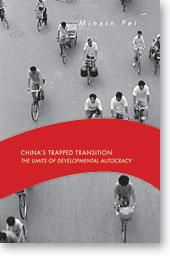
The Limits of Developmental Autocracy
Minxin Pei
简介
The rise of China as a great power is one of the most important developments in the twenty-first century. But despite dramatic economic progress, China's prospects remain uncertain. In a book sure to provoke debate, Minxin Pei examines the sustainability of the Chinese Communist Party's reform strategy--pursuing pro-market economic policies under one-party rule. </p>
Pei casts doubt on three central explanations for why China's strategy works: sustained economic development will lead to political liberalization and democratization; gradualist economic transition is a strategy superior to the \"shock therapy\" prescribed for the former Soviet Union; and a neo-authoritarian developmental state is essential to economic take-off. Pei argues that because the Communist Party must retain significant economic control to ensure its political survival, gradualism will ultimately fail. </p>
The lack of democratic reforms in China has led to pervasive corruption and a breakdown in political accountability. What has emerged is a decentralized predatory state in which local party bosses have effectively privatized the state's authority. Collusive corruption is widespread and governance is deteriorating. Instead of evolving toward a full market economy, China is trapped in partial economic and political reforms. </p>
Combining powerful insights with empirical research, China's Trapped Transition offers a provocative assessment of China's future as a great power. </p>